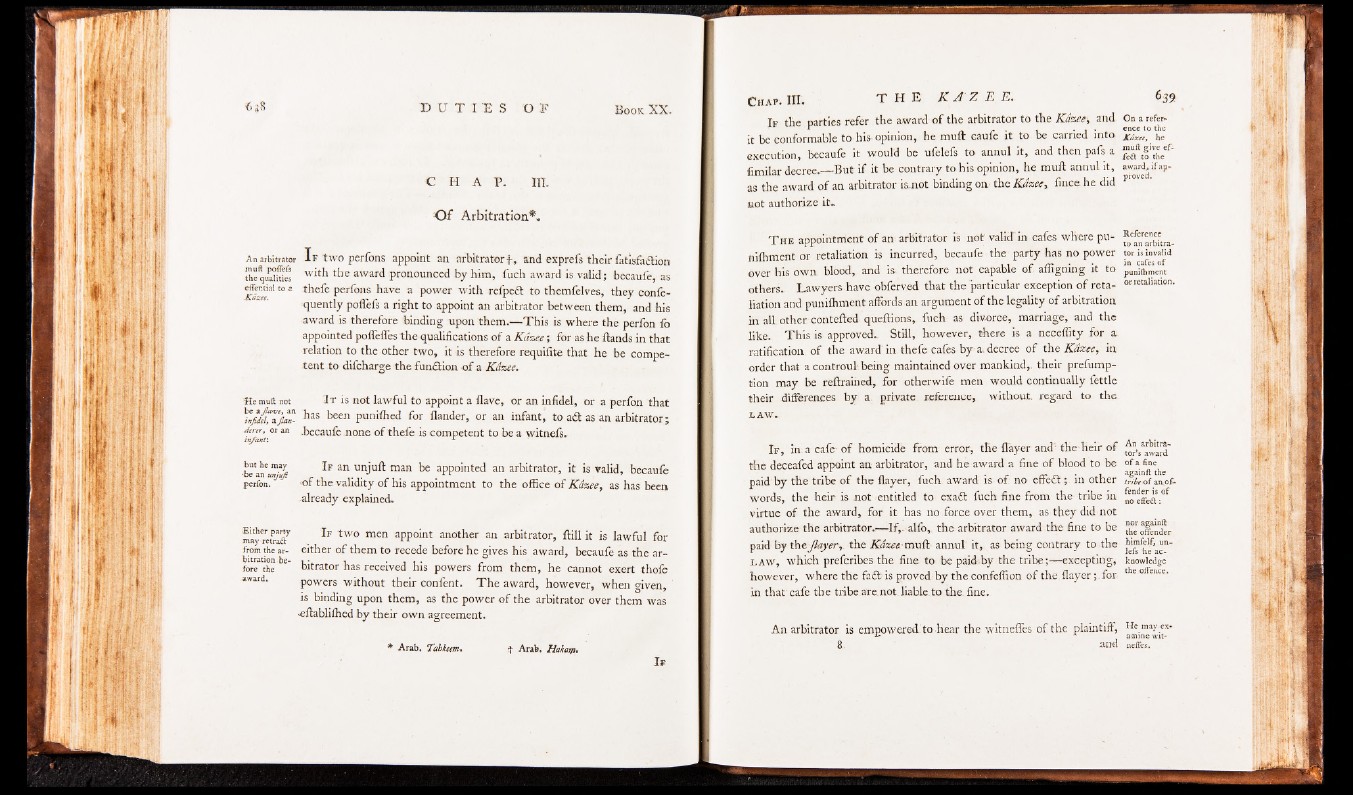
C H A P . HI.
O f Arbitration*.
An arbitrator
muft poffefs
the qualities
effential to a
JCazee.
He muft not
be a flame, an
infidel, a Jlan-
derer, or an
infant:
but he may
•be an unjufi
perfon.
Either party
may retradl
from the arbitration
before
the
award.
I f two perfons appoint an arbitrator f , and exprefs their fatisfâftion
with the award pronounced by him, fuch award is valid ; becaufe, as
thefe perfons have a power with refpeft to themfelves, they cqnfe-
quently poffefs a right to appoint an arbitrator between them, and his
award is therefore binding upon them.— This is where the perfon fo
appointed poffelfes the qualifications of a Kazee ; for as he Hands in that
relation to the other two, it is therefore requifite that he be competent
to difcharge the funftion -of a Kazee.
I t is not lawful to appoint a Have, or an infidel, or a perfon that
has been punifhed for flander, or an infant, to aft as an arbitrator;
.becaufe none of thefe is competent to be a witnels.
If an unjuft man be appointed an arbitrator, it is valid, becaufe
<of the validity of his appointment to the office of Kazee, as has been
already explained.
If two men appoint another an arbitrator, ftill it is lawful for
either of them to recede before he gives his award, becaufe as the arbitrator
has received his powers from them, he cannot exert thofe
powers without their confent. The award, however, when given,
is binding upon them, as the power of the arbitrator over them was
.eftablilhed by their own agreement,
* Arab. Tahkeem. t Arab. Hakatn*
I f
C hap. HI. T H E K A Z E E .
If the parties refer the award of the arbitrator to the Kazee-, and
it be conformable to his-opinion, he muft caufe it to be carried into
execution, becaufe it would be ufelels to annul it, and then pals a
fimilar decree*— But- if it be contrary to his opinion, he muft annul it,
as the award of an arbitrator ismot binding on. the Kazee, fince.he did
not authorize it.
T h e appointment of am arbitrator is not valid in cafes where pu-
nilhment or retaliation is incurred, becaufe the party has no power
over his own blood, and is, therefore not capable of affigning it to
others.. Lawyers have obferved that the particular exception of retaliation
and punilhment affords an argument o f the legality of arbitration
in all. other contefted queftions, fuch as divorce, marriage, and the
like. This is approved.. Still, however, there is a neceflity for a.
ratification of the award'in thefe cafes by> a. decree of the Kazee, in
order that a controul being maintained over mankind,, their prefump-
tion may be reftrained, for otherwife men would continually fettle
their differences by a. private reference, without, regard to the.
L A W .
If , in a cafe of homicidë from error, the flayer and’ the heir of
the deceafed appoint an arbitrator, and he award A fine of blood to be
paid by the tribe of the flayer, fuch award is of no effeft; in other
words, the heir is not entitled to exaft fuch fine from the tribe in
virtue of the award, for it has no .force over them, as they did not
authorize the arbitrator.— If, alfo, the arbitrator award the fine to be
paid by thz flayer,, the Kazee-muR. annul' it, as being contrary to.the
l a w , which prefcribes the fine to be paid.by the tribe;— excepting,
however, where the faft is proved:by the.confeflion of the flayer ;,for
in that'cafe the tribe are. not liable to the fine.
6 39
On a refer«
ence to the
JCazee, he
muft give ef-
fedt to the
award, if approved.
Reference
to an arbitrator
is invalid
in cafes of
punifhment
or retaliation.
An arbitrator^
award
o f a fine
again ft the
tribes f anofc-
fender is of
no effedl:
nor again ft:
the offender
himfelf, un-
lefs 'he acknowledge
the. offence.
An arbitrator is
8
empowered:to hear the witneflfes of the plaintiff,
and
He may.examine
wit-
neffes.